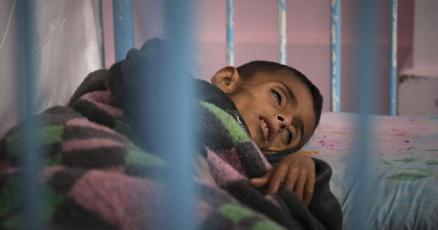As dawn breaks over Gaza City, Maryam Saleh cradles her crying eight-month-old daughter, desperately trying to soothe the infant with the last drops from an empty bottle. Like thousands of mothers across Gaza, Saleh faces an impossible reality: her body can no longer produce breast milk due to her own malnourishment, and formula remains scarce behind the rigid blockade that has choked humanitarian aid to a trickle.
“My children cry from hunger all night,” Saleh told me during our recent interview in northern Gaza. “I boil pasta in water with no sauce, no vegetables, nothing to add flavor or nutrition. Sometimes we don’t eat for days.”
The humanitarian catastrophe unfolding across Gaza has reached catastrophic proportions, according to the latest assessment from the World Food Programme. An estimated 96% of Gaza’s 2.3 million residents face acute food insecurity, with more than 500,000 people experiencing “catastrophic” hunger levels—the highest classification on the international food security scale.
Dr. Adnan Khalil, a pediatrician at Al-Shifa Hospital, reports seeing dozens of children daily with severe malnutrition. “We’re documenting widespread stunting, wasting, and developmental delays that will affect an entire generation,” he explained. “Without immediate intervention, these children will suffer permanent cognitive and physical damage.”
The crisis extends beyond calories to comprehensive nutrition collapse. Essential proteins, vitamins, and minerals have vanished from most diets, leaving Gaza’s population particularly vulnerable to disease. Field hospitals report an alarming increase in normally preventable conditions: scurvy from vitamin C deficiency, rickets from lack of vitamin D, and widespread anemia from iron deficiency.
At Jabaliya refugee camp, I witnessed hundreds of desperate residents rushing toward a rare food distribution truck, many collapsing from exhaustion before reaching aid workers. UN officials confirm that only 10% of necessary food supplies are currently entering Gaza, a fraction of the pre-conflict levels.
The International Committee of the Red Cross has documented 37 infant deaths directly attributable to malnutrition since January. Humanitarian workers fear these official numbers represent only a fraction of the actual toll, as many deaths go unrecorded in areas cut off from medical services.
Economic analysis from the World Bank estimates Gaza’s food security infrastructure has regressed by approximately three decades in just months. The collapse of local markets, destruction of agricultural land, and severing of supply chains have eliminated nearly all domestic food production capacity.
Despite repeated calls from the UN Security Council for unrestricted humanitarian access, the blockade continues to severely limit essential supplies. While Israeli authorities cite security concerns regarding potential weapons smuggling, humanitarian organizations argue the restrictions far exceed reasonable security measures and constitute collective punishment.
The situation in Gaza represents “the most severe and widespread food security emergency we’ve documented in decades,” according to Samuel Morrison, WFP Regional Director. “We’re no longer discussing prevention—we’re in full-scale famine response mode.”
For families like Saleh’s, international diplomatic disputes translate into daily suffering. “Politicians debate while my children waste away,” she said, showing me her emaciated arms. “My three-year-old son weighs what he did at 18 months. Is this what the world calls acceptable?”
As the humanitarian crisis deepens, international pressure on all parties to facilitate unrestricted aid access continues to mount. Yet for Gaza’s starving children, diplomatic breakthroughs cannot come soon enough.
What responsibility do global powers bear for allowing a preventable hunger crisis to reach such catastrophic levels, and at what point does inaction in the face of mass starvation become complicity?























